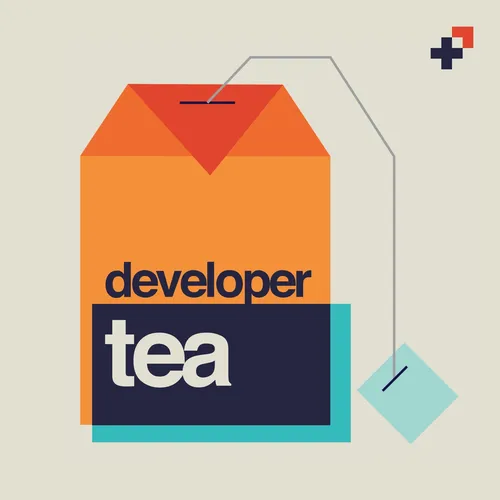
Developer Tea
Developer Tea exists to help driven developers connect to their ultimate purpose and excel at their work so that they can positively impact the people they influence.
With over 17 million downloads to date, Developer Tea is a short podcast hosted by Jonathan Cutrell, engineering leader with over 15 years of industry experience. We hope you'll take the topics from this podcast and continue the conversation, either online or in person with your peers. Email: [email protected]
- Update frequency
- every 7 days
- Average duration
- 17 minutes
- Episodes
- 1268
- Years Active
- 2015 - 2025

Non-Linear Learning and Progress
How does learning happen? In one fell swoop - linear? Or is there another path that learning takes? We pass judgment on ourselves and others, designing our attempts in ways that are suboptimal based …

Friday Refill - Clarified Intentions and Flexible Goals
If you don't understand the motivations underlying your goals, you will always deal with brittle, high-stakes situations. If you understand your goals through the lens of your deeper human motivation…

Too Serious to Succeed
We grow up believing there is a continuum from serious to fun, and that as you get older, you traverse towards the serious side.
The truth is, the more serious you are, the more fun you need to be abl…

Make Your Obstacles Irrelevant
Your obstacles are not a test of pride or an opportunity to prove yourself. They are in your way. There's more than one way to deal with this - so why do we so often choose a difficult path? Perhaps …

Friday Refill: Growth, Uncomfortability, and the Unknown
Growth and comfort rarely mix. But there's more to growth than getting uncomfortable. Different kinds of growth produce different kinds of uncomfortability; which types are you seeking?

Finding Resonance
What specific components of your situation have an outsized effect on you? What resonates in a given scenario? This mental model will help us understand and come to accept why sometimes things just "…

Reframe Your Plateaus
You've hit a plateau - now what?
Today we'll discuss two models for reframing your plateaus; perhaps you haven't hit the wall you think you've hit.
✨ Sponsor: Square
Payment acceptance can be one of the…

Friday Refill: Your Baseline Determines Your Leverage
In today's episode, we talk about how your baseline perceptions and assumptions are the building blocks of your leverage.
✨ Sponsor: Remote Works (Podcast)
The way we work has changed forever. In each …

Ethan Kross, Author of Chatter - Part Two
Ethan Kross joins me today to talk about the importance of our inner voices. In his new book, Chatter, Ethan outlines how our inner voices affect us and how we can shape them as a helpful tool.

Ethan Kross, Author of Chatter - Part One
Ethan Kross joins me today to talk about the importance of our inner voices. In his new book, Chatter, Ethan outlines how our inner voices affect us and how we can shape them as a helpful tool.

Friday Refill: Inviting Growth Into Your Regular Schedule
Humans have the unique ability to intentionally practice and better ourselves. What makes you grow? Are you inviting those triggers and contexts into your regular schedule? How are you making time fo…

Becoming Your Best Coach - Questioning Your Self
You have the greatest potential to coach yourself. But first, you need to understand the ground rules, and build your coaching skills. We start that journey in this episode.
✨ Sponsor: Voyage
Voyage is…

Sources of Truth
How do you determine what is valid, authoritative, useful, and true in your daily decisions and actions? What are your "sources of truth"?
✨ Sponsor: Voyage
Voyage is a tool built by and for developers…

Friday Refill - One Thing at a Time
Ben Franklin used a system of improvement that we can learn from. The idea is simple: focus on one thing at a time.

Katy Milkman, Author of How to Change and Host of Choiceology, Part Two
On today's episode, I interview a personal hero of mine in the podcasting world, Katy Milkman. Katy is the host of Choiceology, a podcast about why and how we make the choices we make. Katy also just…

(Fixed Audio) Katy Milkman, Author of How to Change and Host of Choiceology, Part One
The previous episode's audio had a bit of a hiccup - this one is fixed. Sorry about that!
On today's episode, I interview a personal hero of mine in the podcasting world, Katy Milkman. Katy is the ho…

Friday Refill - Seeking a Different Inside View
Our inside view is not on the outside of others' inside views. In order to think empathetically, we need to develop skepticism about our own perspectives.

Detaching to Seek an Outside View
Our inside view is made up of invisible, inescapable walls. Can we simulate an outside view?
✨ Sponsor: Voyage
Voyage is a tool built by and for developers. Voyage saves hours of your time by automatin…

Conflating Uniqueness with Value
Uniqueness is not inherently valuable. Our heuristic brains interpret uniqueness as worth paying attention to and possibly valuable, and for that reason we tend to over-index on protecting that value…

Refill Friday - Best Practices and Asking When
Best practices feel universally and always applicable, but like anything, best practices require context.